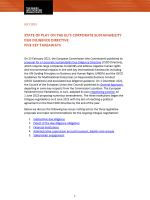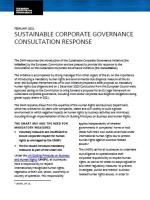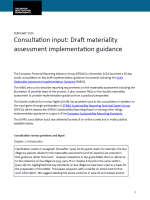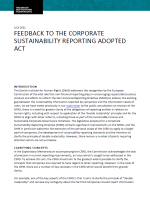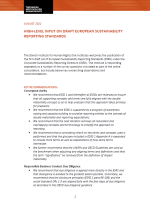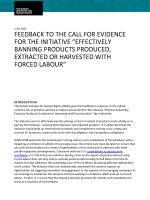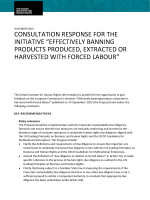Mandatory human rights due diligence and regulatory developments
The development and systematic implementation of policy and regulatory initiatives on human rights and business is a key area for the Human Rights and Business Department at the Danish institute for Human Rights (the Institute). We are engaged in a number of workstreams on mandatory human rights due diligence, corporate reporting and sustainable finance.
We support the development of regulatory frameworks aiming at ensuring business respect for human rights including legislative developments in home states of multinational corporations and at the EU-level. How companies, headquartered in EU countries, are obliged to manage and report on their human rights impacts could have positive impacts on the enjoyment of human rights by workers, communities, consumers and end-users across the value chain.
Read the publication:
Read more about the project:
Mandatory human rights due diligence
Aiming to increase corporate respect for human rights throughout their global operations, some states have enacted or are considering new laws to require or encourage businesses to undertake human rights due diligence. These developments are happening in parallel with a forthcoming proposal on mandatory human rights and environmental due diligence at the EU level. While the precise scope of the various laws differ, common features include requirements on companies to identify human rights impacts, take action to address those impacts, monitor actions taken and in some cases report on their due diligence efforts.
The Institute is providing input to consultations on the development of an EU level mandatory due diligence measure, as well as analysis of key elements of such a measure.
Read the publication:
Read the publication:
Read the publication:
Read the publication:
Read the consultation response:
Read the publication:
Read the publication:
Corporate sustainability reporting
Corporate sustainability reporting is a key element of the smart mix. We support the development of well-designed regulatory mechanisms with clear and comprehensive reporting standards which adequately address human rights issues can support other mandatory measures, including mandatory human rights due diligence, and encourage companies to engage with and report on human rights in a meaningful way in their own operations and throughout their global value chains.
The Institute has engaged with regulatory reforms at the EU level, providing feedback to the review of the Non-Financial Reporting Directive and proposed Corporate Sustainability Reporting Directive, as well as at the national level supporting the development of a so-called ESG disclosure guidance for the Nairobi Stock Exchange and the Kenyan Public Sector Accountability Standards Board (ESG reporting refers to the disclosure of data covering a company's operations in three areas: environmental, social and corporate governance. It provides a snapshot of the business's impact in these three areas for investors, customers and wider stakeholders).
The Institute has a memorandum of understanding with the Global Reporting Initiative Organisation (GRI), under which the organisations collaborate on various activities, including the incorporation of human rights issues into the development of reporting standards.
Read the consultation response:
Read this publication:
Read the publication:
Read the consultation response:
Read the consultation response:
Read the consultation response (August 2022):
Read our five key points on the first set of European Sustainability Reporting Standards (January 2023):
Other regulatory developments
Some states have also introduced a range of other regulatory initiatives which, in different ways, seek to address the negative impacts that businesses can have on the enjoyment of human rights. These include trade rules, development policy and import/export restrictions. The Institute has engaged with these various regulatory reforms through analysis and contributions to consultations.
Read the publication:
Read the consultation response:




